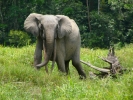 On July 4, Hong Kong customs officials seized about 7.2 metric tons of ivory tusks in what they estimate to be the world’s largest seizure of ivory tusks over the past 30 years. The ivory is estimated to be worth around HK$72 million (~$9.2 million).
On July 4, Hong Kong customs officials seized about 7.2 metric tons of ivory tusks in what they estimate to be the world’s largest seizure of ivory tusks over the past 30 years. The ivory is estimated to be worth around HK$72 million (~$9.2 million).
“This seizure is tragic and represents violent and cruel deaths for possibly hundreds of elephants, all for their ivory tusks and all for an industry that should be in its death throes in the Hong Kong SAR of China,” Grace Ge Gabriel, of the International Fund for Animal Welfare (IFAW), said in a statement.
The customs inspectors discovered the tusks inside a Malaysian consignment declared as “frozen fish”. Following an initial investigation, the authorities have arrested the owner and two staff members of a trading company in Tuen Mun, Hong Kong.
Under CITES guidelines, large-scale ivory seizures, of at least 500 kilograms (0.5 metric tons) point towards the participation of organized crime. And this large seizure moving from Malaysia to Hong Kong highlights the role of the two countries as smuggling hubs of ivory, TRAFFIC added.
“No doubt Hong Kong’s geographic location coupled with the currently relatively lenient penalties in place for anyone convicted of wildlife crime are reasons behind the shipment coming through the port—the case for increasing penalties has never been stronger,” Kuehl said.
In December last year, Hong Kong government announced a three-step plan to phase out domestic ivory trade by the end of 2021.
Under CITES guidelines, large-scale ivory seizures, of at least 500 kilograms (0.5 metric tons) point towards the participation of organized crime. And this large seizure moving from Malaysia to Hong Kong highlights the role of the two countries as smuggling hubs of ivory, TRAFFIC added.
“No doubt Hong Kong’s geographic location coupled with the currently relatively lenient penalties in place for anyone convicted of wildlife crime are reasons behind the shipment coming through the port—the case for increasing penalties has never been stronger,” Kuehl said.
In December last year, Hong Kong government announced a three-step plan to phase out domestic ivory trade by the end of 2021.


